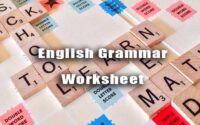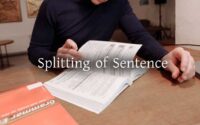Joining Sentences
By using an Infinitive:
(i) The farmer has some land. He has to cultivate it.
The farmer has some land to cultivate.
(ii) The child is very little. It cannot talk properly.
The child is too little to talk properly.
(iii) The student studies hard. He wants to fare well in the exam.
The student studies hard to fare well in the exam.
(iv) The man has two sons. He has to educate them.
The man has two sons to educate.
(v) He has a car. He wishes to sell it.
He has a car to sell.
By using a Participle or Adjective:
(i) They finished the work. They went home.
They went home finishing the work.
(ii) The boy felt tired. He rested for a while
Feeling tired the boy rested for a while.
(iii) We went to their house. We found his father lying in bed.
Going to their house, we found his father lying in bed.
(iv) I walk for health every day. I walk in the morning.
I walk every morning for health.
(v) I hear a scream. The scream is frightening.
I hear a frightening scream.
By using an Adverb or an Adverbial Phrase:
(i) We returned home. It was evening.
We returned home in the evening.
(ii) The train was very late. It was unusual.
The train was unusually very late.
(iii) Sachin Tendulkar will make many records. This is certain.
Sachin Tendulkar will certainly make many records.
(iv) M. S. Dhoni batted fast bowlers. He did not fear at all. any fear.
M. S. Dhoni batted without against fast bowlers.
By using a Noun or a Phrase in Apposition:
(i) Dr. Sarbapalli Radhakrishnan was the second President of India. He learned man.
Dr. Sarbapalli Radhakrishnan, second President of India, was a very learned man.
(ii) Kolkata is the capital of West Bengal. It is a famous seat of learning.
Kolkata, the capital of West Bengal, is a famous seat of learning.
(iii) Pele was a legendary footballer. He is a Brazilian
Pele, a legendary footballer, is a Brazilian.
(iv) William Shakespeare was a great English playwright. He wrote great comedies and tragedies.
William Shakespeare, a great English playwright tragedies.
By using an Absolute Phrase:
(i) The sun set. We started for home.
The sun having set, we started for home ones
(ii) The meeting was over. The crowd dispersed.
The meeting being over the crowd dispersed.
(iii) Sachin Tendulkar scored the century. The captain declared the innings.
Sachin Tendulkar having scored the century, the captain declared the innings.
(iv) The dinner was over. We returned home.
The dinner being over, we returned home.
By using a Preposition with a Noun or a Gerund
(i) Anil Kumble went on bowling for an hour. He did not stop.
Anil Kumble went on bowling for an hour without any stop.
(ii) He sold vegetables. In this way, he earned his living.
He earned his living by selling vegetables.
(iii) Suman was ill. He still came to school.
Inspite of his illness, Suman came to school.
(iv) The man sells books. In this way, he earns his living.
The man earns his living by selling books.
Exercise
Join the following pairs of sentences into Simple ones:
1. The old man is weak. He cannot move.
2. He studies hard. He wants to do well in the exam.
3. The bird saw me come. It flew away.
4. He spoke the truth. He did not fear at all.
5. The sun went up. The fog disappeared.
6. Mr. P. Chidambaram is the Union Finance Minister. He will place the Union Budget next week.
7. Today is a holiday. I shall not go to school.
8. The train was less crowded. It was unusual.
9. Mother heard of my success. She became very glad.
10. The man was unwell. He still came to the function.
11. The match was over. We returned home.
12. He lost his bi-cycle. It was brand new.
13. I hear a scream. The scream is frightening.
14. The man has a large family. He must maintain it.
15. The war broke out. The prices rose.
| Sentence Joining | Examples |
| Use of Conjunctions | Worksheet |
| Exercies |
Joining to Complex
By using Noun Clause
(i) Manoj Tewari is a promising cricketer. It is known to us.
That Manoj Tewari is a promising cricketer is known to us.
(ii) He has come. We know it.
We know that he has come.
(iii) This cannot be cured. This must be endured.
What cannot be cured must be endured.
(iv) This is done. This cannot be undone.
What is done cannot be undone.
By using an Adjective Clause:
(i) This is the place. Bankimchandra was born here.
This is the place where Bankimchandra was born.
(ii) I have lost the bat. My uncle presented it to me.
I have lost the bat which my uncle presented.
(iii) The time was 3 o’clock. The accident occurred then.
It was 3 o’clock when the accident occurred.
(iv) I have lost the wrist watch. My elder brother gave it to me.
I have lost the wrist-watch which my elder brother gave me
By using an Adverbial Clause:
(i) He is poor. He is honest.
Though he is poor, he is honest.
(ii) We confessed our guilt. The Headmaster pardoned us.
The Headmaster pardoned us as we confessed our guilt.
(iii) It is simple. Even a child can understand it.
It is so simple that even a child can understand it.
(iv) He learnt the truth. He was then angry with himself.
He was angry with himself when he learnt the truth.
(v) Make haste. You will miss the train.
Unless you make haste, you will miss the train.
Exercise
Combine each set of Simple Sentences into a Complex Sentence:
1. He taught me a lesson. I can never forget it.
2. I am his neighbour. He did not help me.
3. Someone did it. I am sure of it.
4. He may be rich. He is very honest.
5. A boy said this. I know him.
6. He opposed me. I do not know why.
7. We reached the station. The train left after our arrival.
8. Cristiano Junior was a fine footballer. He died playing football.
9. The sun set. Then we returned home.
10. The lion is strong. The horse is stronger.
11. He saw me come. He ran away.
12. I was tired. I rested for a while.
13. Anirban failed. This is unfortunate.
14. The picnic was over. We left Bandel Church.
15. Vivian Richards was a great batsman. He played cricket for the West Indies.
Joining to Compound
Simple Sentences may be converted into a Compound Sentence by co-ordinating conjunctions:
(i) Kapil Dev could bowl well. Kapil Dev could bat well.
Kapil Dev could bowl and bat well.
(ii) He is slow. He is steady.
He is slow but (he is) steady.
(iii) Make haste. You will miss the train.
Make haste or you will miss the train.
(iv) Rahul Dravid is slow in his batting. Rahul Dravid is very dependable.
Rahul Dravid is slow in batting but very dependable .
(v) He is poor. He is happy
He is poor but he is happy
(vi) He is a fool. He is a knave.
He is a fool and (as well as) a knave.
(vii) I cannot see the object. It is far off.
I cannot see the object, for it is far off.
(viii) You can travel by land. You can travel in water.
You can travel both by land and water.
(ix) Do not be angry. Do not be arrogant.
Do not be angry and arrogant. Or, Be neither angry nor arrogant.
Exercise
Combine each set of Simple Sentences into a Compound Sentence:
1. The man is poor. He is honest.
2. Do it. You will die.
3. Subir was present. Abir was present.
4. We were hungry. We are angry as well.
5. Make haste. You will be late for school.
6. The thief was punished. He was sent to prison.
7. He was a fool. He was a knave.
8. The car met with an accident. None was killed.
9. Rammohan Ray was a wise man. He was also a noble man.
10. The tortoise was slow. It was steady.
11. Mother was annoyed. She kept quiet.
12. He was my way. I asked a policeman to direct me.



